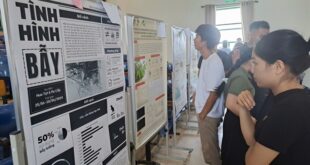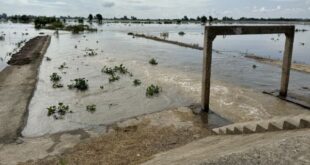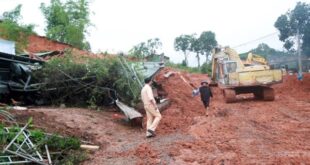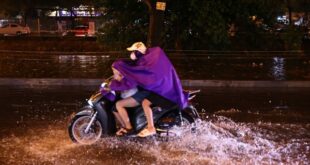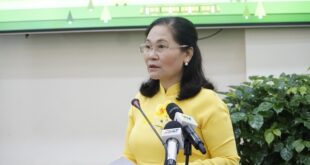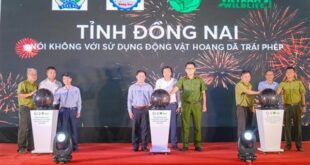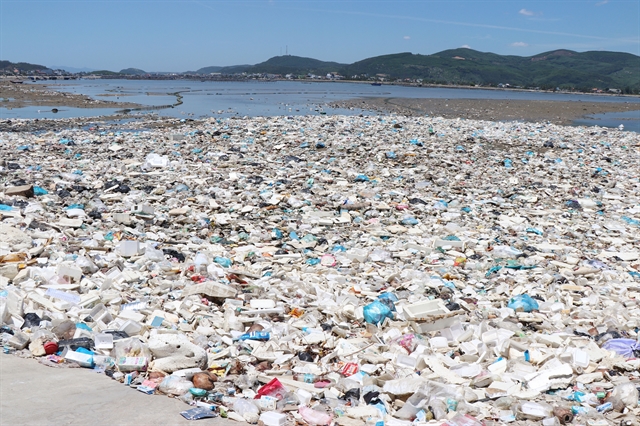 |
| Sa Huỳnh saltwater lagoon is flooded by plastic waste on August 2023. — VNA/VNS Photo Phạm Cường |
Nguyễn Hằng
HÀ NỘI — Việt Nam is accelerating efforts to mitigate plastic pollution and waste through the operation of the Việt Nam National Plastic Action Partnership – a programme to connect key actors, initiatives and investments in order to mobilise resources to shape a more sustainable plastic circular economy for the country as well as contributing to solving global plastic pollution.
Lê Ngọc Tuấn, head of the International Cooperation Department under the Ministry of Natural Resources and Environment (MONRE), told Việt Nam News that the programme had been deployed comprehensively this year, from communication activities to raise public awareness of plastic pollution to creating a more complete network to further improve the organisation of the programme following the guidance of the Global Plastic Action Partnership.
There were two task forces established this year, focusing on boosting innovation and unlocking financing, and promoting gender equality and social inclusion, he said on the sidelines of the third meeting of NPAP’s Leadership Board themed “Building Momentum for Plastic Action” held on Friday in Hà Nội.
Thereby, we would gradually complete the NPAP programme to meet the requirements and principles, which were to create a multi-stakeholder platform that enabled collaboration between the Government and other vital partners to solve plastic waste and pollution.
“This year’s activities are creating momentum (for the operation of the programme) next year when the world is expected to conclude negotiations to build a global agreement on plastics,” he said.
Under the ministry’s report, NPAP has continued to consolidate, maintain and support a network of nearly 200 organisations and businesses participating in the programme, represented by heads and experts from ministries, sectors, international organisations, domestic and foreign companies, non-governmental organisations and research institutes this year.
Tuấn said the programme initially mobilised all parties involved. That was a favourable thing so that when we sign and implement the global plastic agreement (in 2024), we would have already prepared both from a social perspective and from the participation of businesses and government agencies.
NPAP operation and results
MONRE and the World Economic Forum signed a Letter of Intent for strategic cooperation on the issue of plastic waste in January 2019.
According to the letter, the Global Plastic Action Partnership, the World Economic Forum and the ministry coordinated to establish the National Plastic Action Partnership (NPAP) in Việt Nam in 2020.
On December 23, 2020, NPAP was officially launched under direction of the Deputy Prime Minister Trịnh Đình Dũng, in the presence of World Economic Forum President Borge Brende.
On November 19, 2021, the NPAP National Leadership Board was established to advise the Minister of Natural Resources and Environment on policies, solutions and strategic directions for the programme.
Since August 2022, the NPAP Secretariat is officially hosted by the United Nations Development Programme (UNDP) Việt Nam, which operates and leads the support for NPAP’s activities.
According to the ministry, NPAP’s reports provided useful data and information to support policymakers in developing and revising plastic waste management policies towards a plastic circular economy in the country over the past time.
The NPAP’s report on Việt Nam Plastic Action Assessment and Roadmap Considerations, published in late 2022, described three interventions, including reduction and substitution of plastics; expanding economically viable recycling; and expanding the collection and treatment system of household solid waste and prevent indiscriminate discharge. The interventions were expected to support the implementation of the national targets of reducing marine plastic waste by 50 per cent by 2025 and by 75 per cent by 2030 as well as contributing to the implementation of Sustainable Development Goals of Việt Nam.
The NPAP’s report on Gender Context Assessment of the Plastic Value Chain in Việt Nam was officially launched in August 2023, providing a comprehensive assessment of the role of different gender groups in the domestic plastic waste management system, especially the contribution of the informal workers in collecting, sorting and recycling plastic waste. The report aims to clarify gaps and issues on gender equality and social inclusion in the plastic value chain, contributing to the development of inclusive and gender-responsive policies to design and implement solutions to address plastic waste pollution in Việt Nam.
The ministry said the NPAP also mobilised technical support from its members and partners, including the Alliance to End Plastic Waste (AEPW), GreenHub, An Phát Group, Dow Việt Nam Group, Việt Nam Administration of Seas and Islands (VASI), Department of Environmental Pollution Control (PCD) during the CSIRO Indo-Pacific Plastics Innovation Network (IPPIN) Incubator and Accelerator Programme.
Võ Tuấn Nhân, deputy minister of Natural Resources and Environment, said on the national level, the programme organised many plastic talks to attract the participation of organisations and individuals to spread the meaning of solving plastic pollution in the country.
He said media campaigns had conveyed many meaningful messages about the importance of protecting the environment and reducing the amount of plastic waste.
On the international level, the NPAP contributed its voice at the Global Plastics Summit and the third session of the Intergovernmental Negotiating Committee to develop an international legally binding instrument on plastic pollution, including in the marine environment (INC-3) in Kenya in November, 2023, he added.
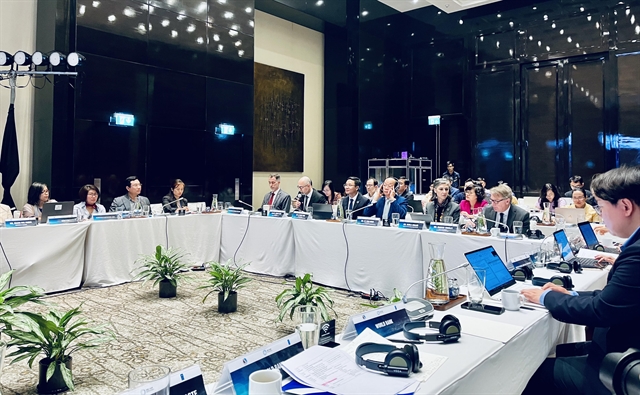 |
| Participants at the third meeting of NPAP’s Leadership Board on Friday afternoon in Hà Nội. — VNS Photo Nguyễn Hằng |
Challenges and plans for 2024
Tuấn said the NPAP model was a new model, so we also face certain challenges when running the model such as how to mobilise all stakeholders to join to solve the challenge of plastic pollution.
“To solve plastic pollution, we need a huge amount of resources, so the main challenge is how to mobilise financial contributions to work together towards a common goal,” he said.
However, with everything we had done in 2023, with the introduction of roadmaps for financial mobilisation and building an overall picture of support projects, it was possible to say that we had a momentum to enter 2024 with confidence and stronger actions on the programme, he added.
According to Tuấn, as the year of 2024 with many advantages and challenges for the programme approached, the ministry was committed to working with organisations and individuals to carry out actions towards stronger and more sustainable goals to reduce plastic pollution.
The focus would be promoting the active participation and responsibility of the social community and the business sector so that they can demonstrate their role in building a sustainable environment towards a plastic waste-free society.
The programme needed to demonstrate its leading role, being a tool to connect innovations, form comprehensive cooperation and encourage sustainable investment.
These collective efforts would serve as the driving force propelling Việt Nam towards a future unencumbered by the detrimental impacts of plastic pollution in the coming years.
Ramla Khalidi, Resident Representative of UNDP in Việt Nam, said addressing plastic pollution required our collective efforts, working together in partnership to drive joint planning and implementation based on our respective strengths and roles.
The contributions of all members, including policymakers, investors, innovators and researchers, would determine the NPAP’s sustainability and success.
UNDP’s experience showed that the informal sector, particularly women waste collectors, plays a vital role in collecting, sorting and recycling plastic waste.
UNDP would continue to work closely with the Government and relevant stakeholders to increase the momentum of the Việt Nam NPAP to contribute to the national target of reducing marine plastic waste by 75 per cent by 2030.
In the meantime, the environmental ministry planned that next year, the NPAP will continue to focus on supporting the development and implementation of a more sustainable and inclusive circular economy.
Specifically, it will consolidate the operational structures of the NPAP Leadership Board, promote the activities of existing task forces, conduct research on the financing roadmap and investment to reduce plastic pollution in Việt Nam, including identifying current investment gaps, priority areas for investment, appropriate sources of finance and investments, and analyse funding mechanisms for successful plastic waste and pollution reduction activities and initiatives.
It will also strengthen international cooperation, attract foreign organisations and research institutes to participate in investigation, research and technology transfer, sharing information and experience, especially in investigating the current status of plastic waste in order to improve the plastic waste management in Việt Nam.
Additionally, organising communication activities and campaigns on behaviour change for organisations and individuals in plastic waste management is one of its plans next year.
It is estimated that Việt Nam generates around 3.7 million tonnes of post-consumer plastic waste each year, a figure that is growing by 6.2 per cent annually. Despite major commitments from the Government, ministries and sectors, leakage of plastic waste into the country’s water bodies is projected to grow by 106 per cent between 2018 and 2030, from approximately 182,000 tonnes per year to 373,000 tonnes per year. — VNS
INBOX:
NPAP Gender and Inclusivity Task Force launched
HÀ NỘI — The NPAP’s Gender Equality and Social Inclusion Task Force, co-chaired by the Canadian Embassy in Việt Nam and the Institute of Strategy and Policy on Natural Resources and Environment, was launched at the third meeting of NPAP’s Leadership Board on Friday in Hà Nội.
The task force brings together 16 members including policy makers, waste collectors and recyclers, impact investors, innovators and gender experts. The objective of the task force is to mitigate plastic waste and plastic pollution by promoting gender and inclusivity interventions that take into account the roles of women and men and different social groups in supporting plastic waste collection, segregation and recycling.
Speaking at the meeting, Shawn Steil, Ambassador of Canada to Việt Nam, said Canada was honoured to jointly launch, with the ministry and 16 member organisations, the task force to address inequalities and vulnerabilities in the plastic value chain.
As the host of the fourth Intergovernmental Negotiating Committee (INC-4) meeting on a global treaty on plastics, Canada looks forward to fostering international consensus to end plastic pollution by 2040, he said. — VNS
- Reduce Hair Loss with PURA D’OR Gold Label Shampoo
- Castor Oil Has Made a “Huge” Difference With Hair and Brow Growth
- Excessive hair loss in men: Signs of illness that cannot be subjective
- Dịch Vụ SEO Website ở Los Angeles, CA: đưa trang web doanh nghiệp bạn lên top Google
- Nails Salon Sierra Madre
 VnExpress News The News Gateway of Vietnam
VnExpress News The News Gateway of Vietnam
